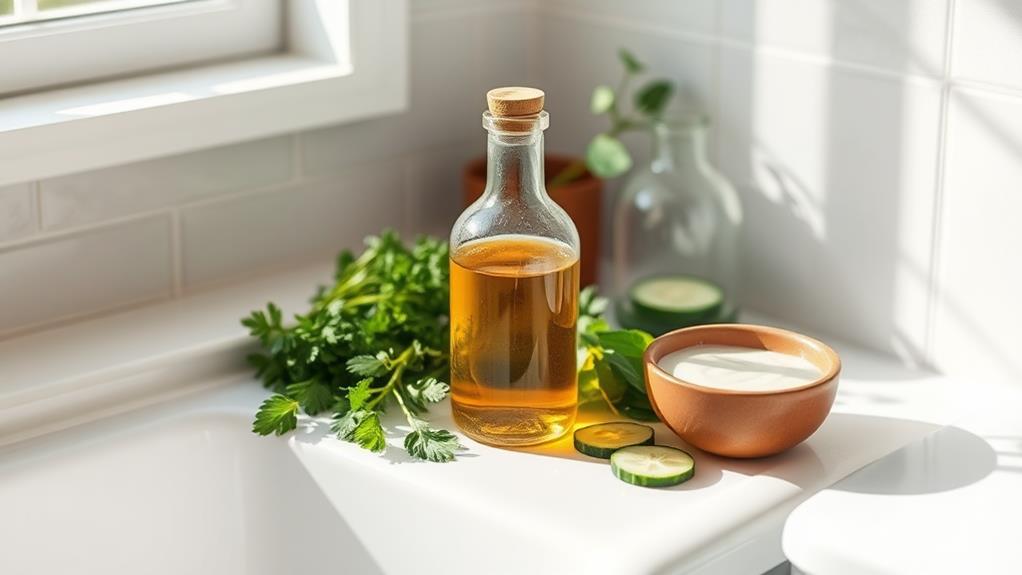You might be surprised to learn how versatile vinegar can be for your skincare routine. Its natural properties can help balance your skin's pH, treat acne, and even soothe irritation. From using it as a toner to creating a DIY face wash, there are numerous ways to incorporate vinegar effectively. But before you start, it's crucial to understand the best types to use and how to apply them safely. Curious about the specific methods and their benefits? There's much more to explore that could transform your approach to skincare.
Benefits of Vinegar for Skin
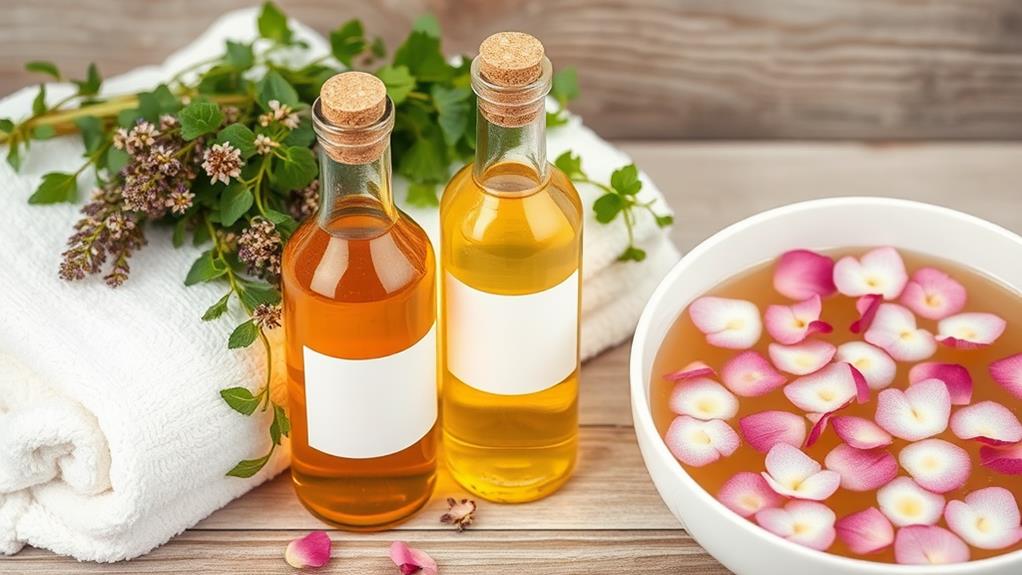
Vinegar, especially apple cider vinegar, offers several impressive benefits for your skin. First off, vinegar helps balance your skin's pH levels. This balance is key to preventing dryness and irritation, so you can enjoy a healthier complexion.
Plus, its antimicrobial properties fight off acne-causing bacteria. This means fewer breakouts and blemishes for you!
But that's not all—vinegar acts as a natural exfoliant too. It gently removes dead skin cells, enhancing your skin texture and brightness.
And let's be honest, who doesn't want a glow that could light up a room?
The acetic acid in vinegar is another superstar. It supports skin regeneration and healing, making it helpful for minor wounds and irritations.
So, if you've got a pesky scratch, vinegar might be your new best friend.
Regular use of vinegar can even boost the absorption of your other skincare products. Imagine getting better results from your favorite creams and serums!
With all these benefits, it's clear that incorporating vinegar into your skincare routine is a win-win for your skin health.
Types of Vinegar to Use
When it comes to choosing the right type of vinegar for your skincare routine, each variety offers unique benefits.
Apple Cider Vinegar (ACV) is a superstar for treating acne and soothing skin irritation. Its anti-inflammatory and antimicrobial properties make it a go-to for many.
If you're looking for something milder, consider Rice Vinegar. It's gentle on sensitive skin and helps balance your skin's pH without causing irritation.
Now, if you need a strong option for cleaning or minor skin issues, White Vinegar is your friend. Its antibacterial properties can tackle those pesky little problems.
Want to add a bit of sweetness to your skincare? Balsamic Vinegar might be your answer! It contains antioxidants that promote a healthier complexion, plus it smells nice.
Lastly, Coconut Vinegar, while not mentioned here, is also worth noting for its moisturizing benefits.
Vinegar as a Facial Toner
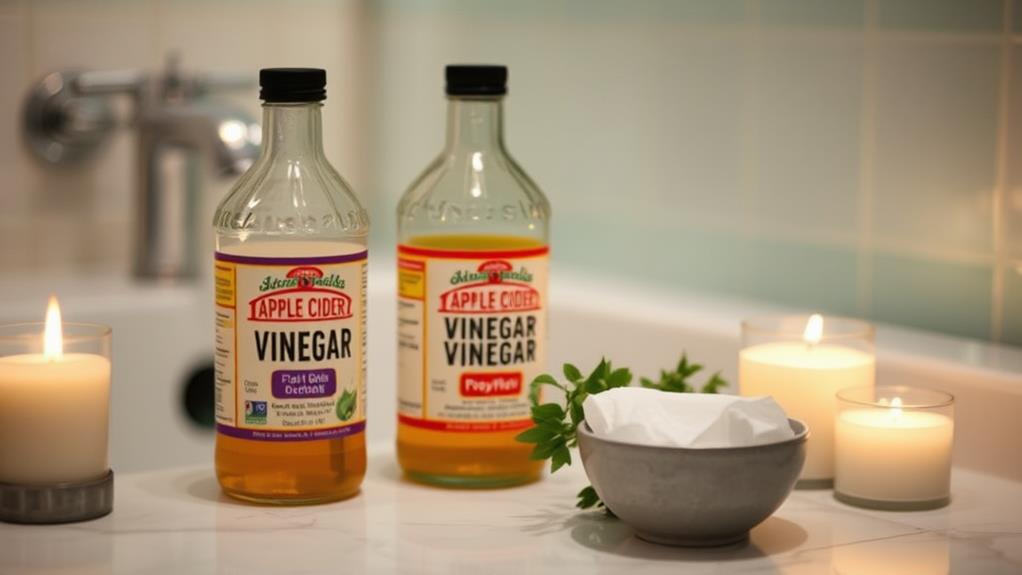
Using vinegar as a facial toner can elevate your skincare routine to the next level. When you use vinegar, especially apple cider vinegar, it helps balance your skin's pH levels. This balancing act can prevent dryness and irritation, making your skin feel healthier overall. Plus, the acetic acid in vinegar has some fantastic health benefits for your skin.
To use vinegar safely, just remember to dilute it with water—mix one part vinegar to three parts water. This makes it gentler on sensitive skin and reduces any irritation risk. If you struggle with acne, you'll love this: vinegar has antimicrobial properties that can fight off acne-causing bacteria!
As a natural astringent, vinegar tightens pores and can make them less noticeable, giving you a smoother texture.
And here's a fun fact: using vinegar as a toner can actually help other skincare products work better, so you'll maximize their effectiveness. It's like giving your skin a little pep talk to absorb all that good stuff!
DIY Vinegar Face Wash
Creating your own DIY vinegar face wash is an easy and effective way to cleanse your skin naturally. All you need is 1/4 cup of warm water and 1 tablespoon of apple cider vinegar. Mix them together, and you've got a gentle cleanser that helps balance your skin's pH and removes impurities.
Plus, the antimicrobial properties of cider vinegar can help fight off acne-causing bacteria—goodbye, breakouts!
This vinegar face wash is a great alternative to harsh soaps that might irritate your skin. It's like giving your face a warm hug instead of a slap!
If you want to kick it up a notch, consider adding a few drops of essential oils, like tea tree or lavender. These oils can soothe and nourish your skin, making your skincare regimen even better.
Before you plunge into it, remember to patch test the mixture on a small area of your skin. It's super important, especially if you have sensitive skin, to make sure you don't have any bad reactions.
Vinegar Spot Treatment for Acne
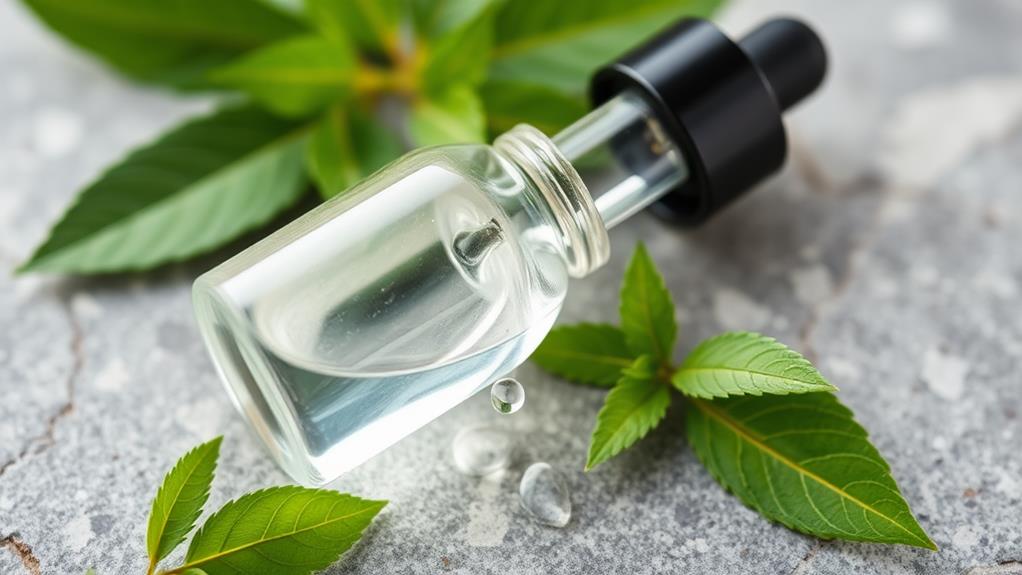
If you're looking for an effective way to tackle stubborn breakouts, vinegar spot treatment could be your answer. Apple cider vinegar (ACV) is a superstar when it comes to fighting acne. Thanks to its antibacterial properties, it helps zap those pesky bacteria that cause breakouts, reducing inflammation and redness.
To use it as a spot treatment, simply mix one part vinegar with three parts water. This dilution makes it gentler on your skin. Then, grab a cotton swab, dip it in the mixture, and apply it directly to the blemish.
But wait, there's more! ACV also acts as a natural astringent, which means it can help tighten your pores and reduce the appearance of acne scars over time. Plus, the acetic acid in vinegar works wonders for balancing your skin pH. When your skin's pH is just right, it can help prevent that annoying oiliness that leads to more acne.
Many people swear by regular use of diluted ACV, claiming it improves overall skin texture and clarity.
Soothing Vinegar Compress
A soothing vinegar compress can be a game-changer for your skin when irritation strikes. When you mix 1 part diluted vinegar with 3 parts water, you create a gentle treatment for skin irritations and inflammation. Just imagine your sunburn or insect bites feeling better in no time!
Applying this compress for about 15-20 minutes can work wonders, thanks to vinegar's anti-inflammatory properties.
But wait, there's more! The acetic acid in vinegar has antimicrobial effects, helping to cleanse your skin and reduce the risk of infection in minor wounds. If you want to kick the soothing effects up a notch, consider adding essential oils like lavender to your vinegar solution. It not only smells great but also adds more calming benefits.
Regular use of a vinegar compress may even improve your overall skin texture and hydration. It helps balance your skin's pH levels and promotes better moisture retention.
Exfoliating With Vinegar Scrubs
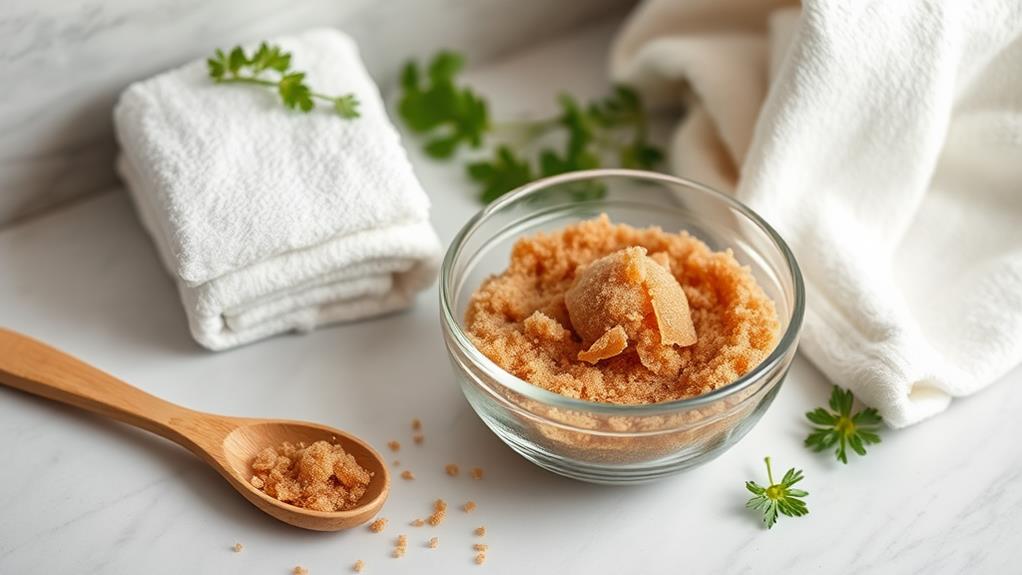
After soothing your skin with a vinegar compress, consider taking your skincare routine up a notch by incorporating vinegar scrubs.
These scrubs are fantastic for exfoliating, which means they help remove dead skin cells and reveal a brighter, smoother complexion. Apple cider vinegar, in particular, contains malic acid that gently exfoliates your skin, making it perfect for those with sensitive skin.
To whip up your own vinegar scrub, mix equal parts of cider vinegar and sugar or salt. Apply this mixture in gentle circular motions—just be careful to avoid scrubbing too hard to prevent irritation.
Regularly using vinegar scrubs can also help balance your skin's pH levels. A balanced pH means less dryness and irritation, which is a win-win for your skin health!
But remember, it's important to dilute the vinegar to keep your skin happy. Always do a patch test first, too! You wouldn't want a surprise, right?
Vinegar Soaks for Skin Health
With vinegar soaks, you can easily boost your skin health and soothe irritation. Just grab some apple cider vinegar and dilute vinegar with water—mix one part vinegar to three parts water. This simple soak can be your go-to for easing skin problems like eczema or athlete's foot.
Soaking for about 15 minutes lets the acetic acid work its magic, thanks to its antimicrobial properties that help prevent infection and promote skin healing. For the best results, try to make vinegar soaks a daily habit. You might just notice your skin feeling better and looking healthier over time!
Plus, if you want to add an extra boost, consider dropping in some essential oils like lavender. They can really enhance the soothing effects of your soak.
After you finish soaking, don't forget to gently pat your skin dry. It's super important to follow up with a moisturizer to lock in hydration and keep your skin barrier happy.
Healing Properties of Vinegar
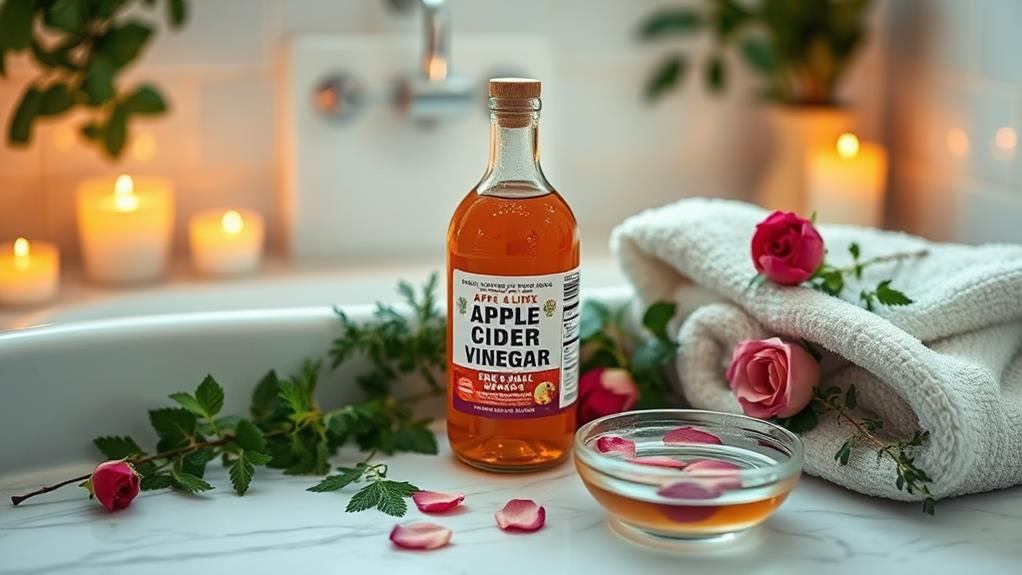
While many people know vinegar as a kitchen staple, its healing properties make it a valuable addition to your skincare routine. Cider vinegar, in particular, has fantastic antibacterial properties that help reduce inflammation and prevent infections in minor wounds. This means you can speed up the healing process and get back to your daily adventures!
The acetic acid in vinegar works wonders, helping to remove dead tissue. This process is called debridement, and it encourages new tissue to grow, which is pretty cool!
Plus, when you indulge in regular vinegar soaks, you're enhancing blood circulation to those affected areas. This extra blood flow supports skin regeneration and healing, making you feel like a rock star.
Don't forget, the acidic environment created by vinegar helps defend against pesky pathogens, reducing the chances of complications.
And if you're dealing with swelling or pain around wounds, vinegar soaks can provide some much-needed relief. So, why not give vinegar a try? It's not just for salad dressing; it can be your skin's new best friend!
Vinegar for Balancing Ph Levels
Vinegar not only aids in healing but also plays a key role in balancing your skin's pH levels. When you use cider vinegar, its mildly acidic pH, which ranges from 2 to 3, helps neutralize those pesky alkaline skin conditions. This balance is super important because it prevents dryness and irritation, keeping your skin looking fresh and vibrant.
High alkalinity can leave your skin dull and more prone to breakouts. By using diluted vinegar solutions regularly, you can promote natural exfoliation, gently removing dead skin cells without any harsh chemicals. Plus, vinegar is effective in inhibiting bacterial growth, which means fewer chances for those unwanted blemishes to pop up!
Want to make your other skincare products work even better? The acetic acid in vinegar enhances absorption, so you get the most out of your favorite creams and serums.
Incorporating vinegar into your routine can help balance the skin's pH and regulate natural oil production. All of this leads to a balanced and healthy complexion that'll make you feel great. So, why not give vinegar a try? Your skin will thank you!
Vinegar and Wound Care
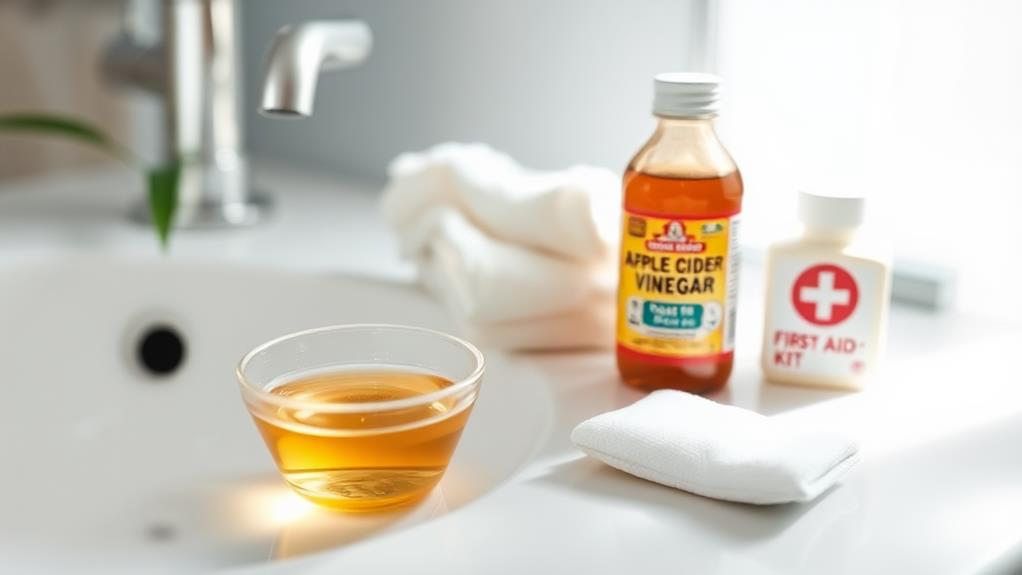
When it comes to wound care, apple cider vinegar (ACV) stands out for its impressive antibacterial properties. Using cider vinegar can help prevent infections in minor wounds and irritations. This happens because it creates an acidic environment that keeps nasty germs at bay.
However, there's a catch: you must dilute it with water. A good mix is 1 part vinegar to 3 parts water. If you don't, applying undiluted vinegar can sting like a bee and make your skin unhappy!
When you use diluted ACV, it can actually promote healing. It helps boost blood circulation to the injured area, which is essential for skin regeneration.
Plus, it supports the removal of dead skin cells, making way for fresh, new skin. You'll also notice that regular applications can reduce swelling around wounds, offering some sweet pain relief.
Antimicrobial Effects of Vinegar
Many people seek effective solutions for skin issues, and vinegar, particularly apple cider vinegar (ACV), offers impressive antimicrobial benefits. If you're struggling with acne, you might be excited to learn that cider vinegar contains acetic acid, which is known for its antimicrobial properties. This means it can fight off the pesky bacteria that contribute to breakouts and skin infections.
Using ACV as a skin toner can work wonders for your skin health. When diluted with water, it helps balance your skin's pH levels, keeping harmful microorganisms at bay. Studies show that vinegar can even reduce biofilm formation, which is key to preventing acne-causing bacteria from sticking around.
Plus, ACV is a natural alternative to harsh chemical treatments, making it a wallet-friendly choice. You can say goodbye to those expensive products!
Anecdotal evidence suggests that applying vinegar can soothe skin irritations and minor wounds, helping to prevent infections. So, why not give it a try? With its ability to promote healthy skin and tackle those annoying blemishes, ACV could become your new best friend in your skincare routine!
Vinegar for Sunburn Relief
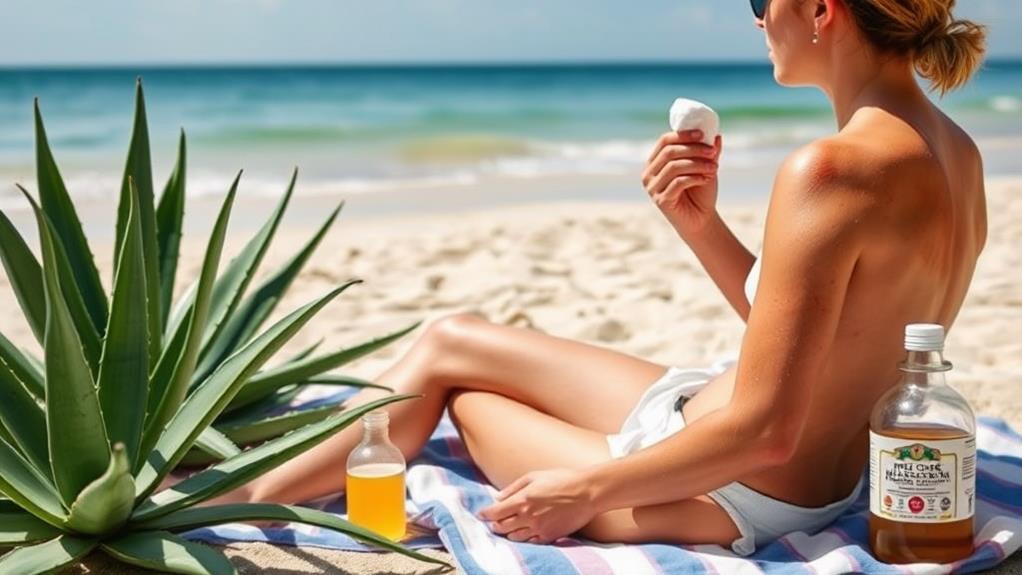
Relief from sunburn can be found in the soothing properties of apple cider vinegar (ACV). If you've spent a bit too much time under the sun, don't worry—cider vinegar can help! You can easily mix one part vinegar with three parts water and apply it to your sunburned skin. This simple solution works wonders because the acetic acid in vinegar helps balance your skin's pH, promoting healing and preventing dryness.
ACV isn't just magical for your salads; it also has anti-inflammatory properties that can reduce redness and irritation. Plus, the antioxidants in apple cider vinegar can speed up skin regeneration, helping you feel better sooner. You might even enjoy a cooling spray or soak, giving your sunburned skin a revitalizing relief.
Before diving in, though, it's smart to do a quick patch test, especially if your skin is sensitive. Just apply a small amount of the mixture on a less sunburned area to make sure it doesn't cause any irritation.
With a little patience and this vinegar trick in your skin care routine, you'll be back to your sunny self in no time!
Vinegar for Smoother Skin Texture
Achieving smoother skin texture can be as simple as incorporating vinegar, particularly apple cider vinegar, into your skincare routine. This magical liquid acts as a natural exfoliant, gently buffing away dead skin cells. By doing this, it helps you reveal that fresh, radiant skin underneath.
Plus, the acetic acid in cider vinegar balances your skin's pH levels, preventing dryness and irritation that can cause uneven textures.
When you regularly use diluted vinegar, you're not just smoothing things out; you're also improving how well your other skincare products work. It's like giving them a backstage pass to your skin!
Anecdotal evidence even suggests that vinegar can minimize the appearance of pores, leading to a more even complexion. And if you're worried about breakouts, don't fret — vinegar has antibacterial properties that help reduce acne, too.
You can easily add cider vinegar to your skincare routine by using it in DIY face masks or toners. Just remember to dilute it with water, so your skin stays happy.
With a little vinegar magic, you'll be on your way to smoother skin texture in no time!
Enhancing Vinegar With Essential Oils
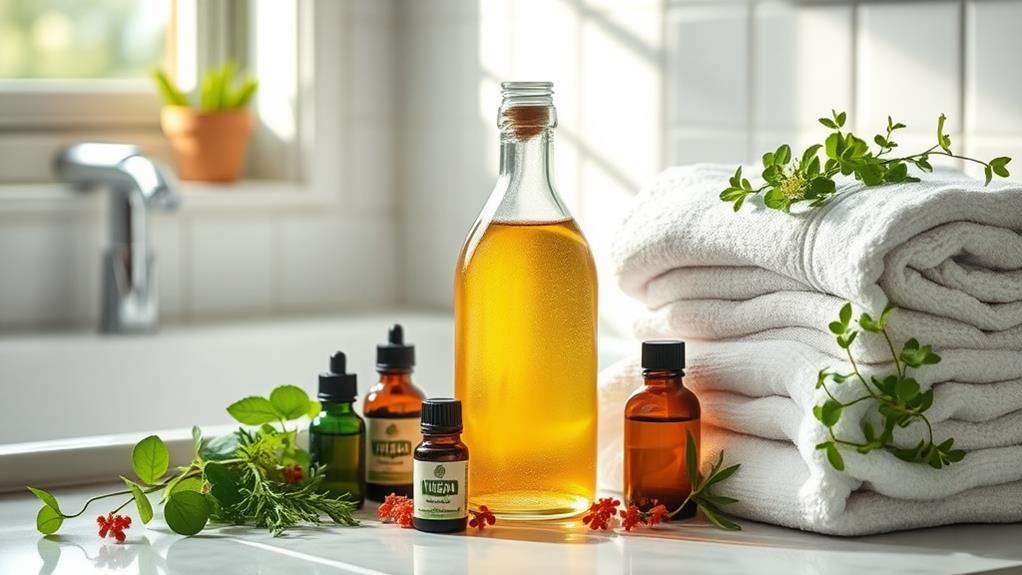
Incorporating essential oils into your vinegar routine can elevate the benefits you already enjoy for smoother skin texture. These little powerhouses, like lavender or tea tree oil, add extra antimicrobial and anti-inflammatory perks to your vinegar mix.
By combining vinegar with essential oils, you can create a customized skincare treatment that targets specific concerns, like pesky acne or irritation.
To get started, just use a ratio of 3-5 drops of your chosen essential oil per tablespoon of vinegar. This way, you'll guarantee a safe and effective application. Plus, let's be real—the delightful fragrance of essential oils makes the whole experience a lot more enjoyable. Who doesn't want to smell nice while taking care of their skin?
Before diving in, don't forget to do a patch test! Apply a small amount of your vinegar and essential oil blend on a tiny area of skin to check for any reactions or sensitivities. After all, better safe than sorry!
Safety Precautions for Vinegar Use
When using vinegar on your skin, it's crucial to prioritize safety to avoid irritation and discomfort. First off, always dilute vinegar with water before applying it. A good rule of thumb is to mix 1 part vinegar to 3 parts water. This helps prevent that pesky irritation that can occur when your skin is sensitive.
Before you go full throttle with your vinegar regimen, don't forget to do a patch test! Choose a small area of skin, apply your diluted mixture, and wait for 24 hours. If you notice any redness or discomfort, it's best to skip the vinegar for now.
Also, steer clear of applying vinegar on open wounds or irritated skin. Trust me, that stinging sensation isn't something you want!
If you're unsure about using vinegar, especially if your skin is sensitive or you have existing skin conditions, it's a smart idea to consult with a dermatologist. They can give you personalized advice and help you find the best way to use vinegar safely.
Personal Experiences With Vinegar Soaks
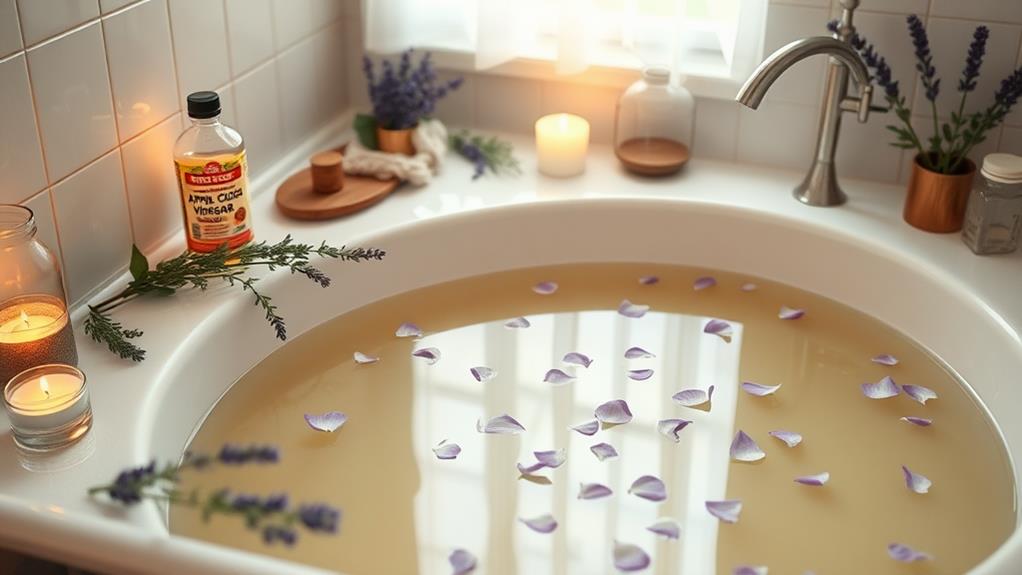
Many users have discovered the benefits of vinegar soaks for various skin conditions, sharing their personal successes and transformations. For instance, in St. Louis, people have reported amazing improvements in skin issues like athlete's foot after adding cider vinegar soaks to their routines. Imagine finally saying goodbye to those pesky itches and irritations!
Many find that a vinegar soak really does provide noticeable relief.
What's cool is that you can tailor your vinegar soak to your needs. Some folks add essential oils for that extra kick, making the soak not only effective but also relaxing. Just picture yourself unwinding in a warm bath with a delightful scent!
Consistency is key, though. Using a vinegar soak daily can help you see even better results over time. Bathing with vinegar isn't just a remedy; it's a way to promote smoother, clearer skin overall.
